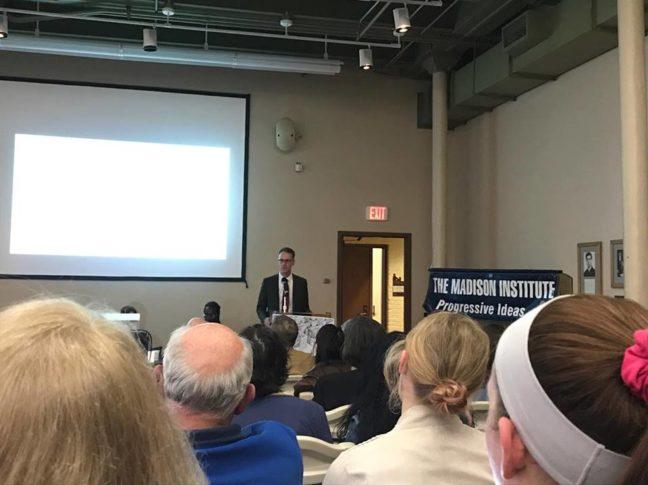The Madison Institute and Wisconsin Union Directorate Committee on Society and Politics hosted a panel of experts Wednesday to speak about minimum sentencing’s effects on mass incarceration and how society can move away from this practice.
The panel included Marquette University law professor Michael O’Hear, University of Wisconsin law professor Cecelia Klingele and former prisoner and current vice president of Madison Organizing in Strength, Equality, and Solidarity, Talib Akbar. All three speakers are legal professionals and criminal justice reform advocates.
O’Hear said the introduction of mandatory minimums in sentencing policy and the reduction in the discretionary power of parole boards to grant release from prison lead to mass incarceration.
“Suddenly, it didn’t matter how well an inmate was behaving or how close they were to being released,” O’Hear said. “Mandatory minimums would keep them in prison.”
O’Hear said incarceration rates in Wisconsin have risen from 125 people incarcerated per 100,000 in 1978 to just less than 375 people incarcerated per 100,000 in 2011. This is more than a 200 percent increase.
In the 1970s, mandatory minimums were introduced and discretionary power was beginning to be taken away from judges, O’Hear said. He said the rise in incarceration rate is correlated with the mandatory minimums and less discretionary power.
But, O’Hear doesn’t believe reinstating judicial discretion in sentencing would fix the problem of mass incarceration.
“Discretionary parole and judicial discretion is not the answer to ending mass incarceration,” O’Hear said. “Presumptive or mandatory release systems are more promising.”
As a former prisoner, Akbar spoke about his personal experiences with both the prison and parole systems.
Akbar said his main problem with the parole system is the frequency with which parolees land back in prison for “unfair” or “unjust” reasons.
“A person should not be sent back to prison because of an unproved allegation that they broke a rule on parole,” Akbar said.
The problem with mass incarceration is not necessarily the number of people imprisoned, Klingele said, but rather the scope and tenure of their sentences.
Klingele said because of mandatory minimums and coverage by the mainstream media, Americans have come to expect disproportionately and unnecessarily long prison terms for crimes of all types.
“We’re conditioned to believe that a serious sentence has to be measured through multiple decades, when in fact, the amount of change that can take place in just a few years is substantial,” Klingele said.
Collectively, the panelists said they believe change is possible through activism.
But, state institutions must be changed systematically if mass incarceration is to truly be alleviated, O’Hear said.
“Local leadership has real potential to end mass incarceration, but state support is needed,” O’Hear said.


